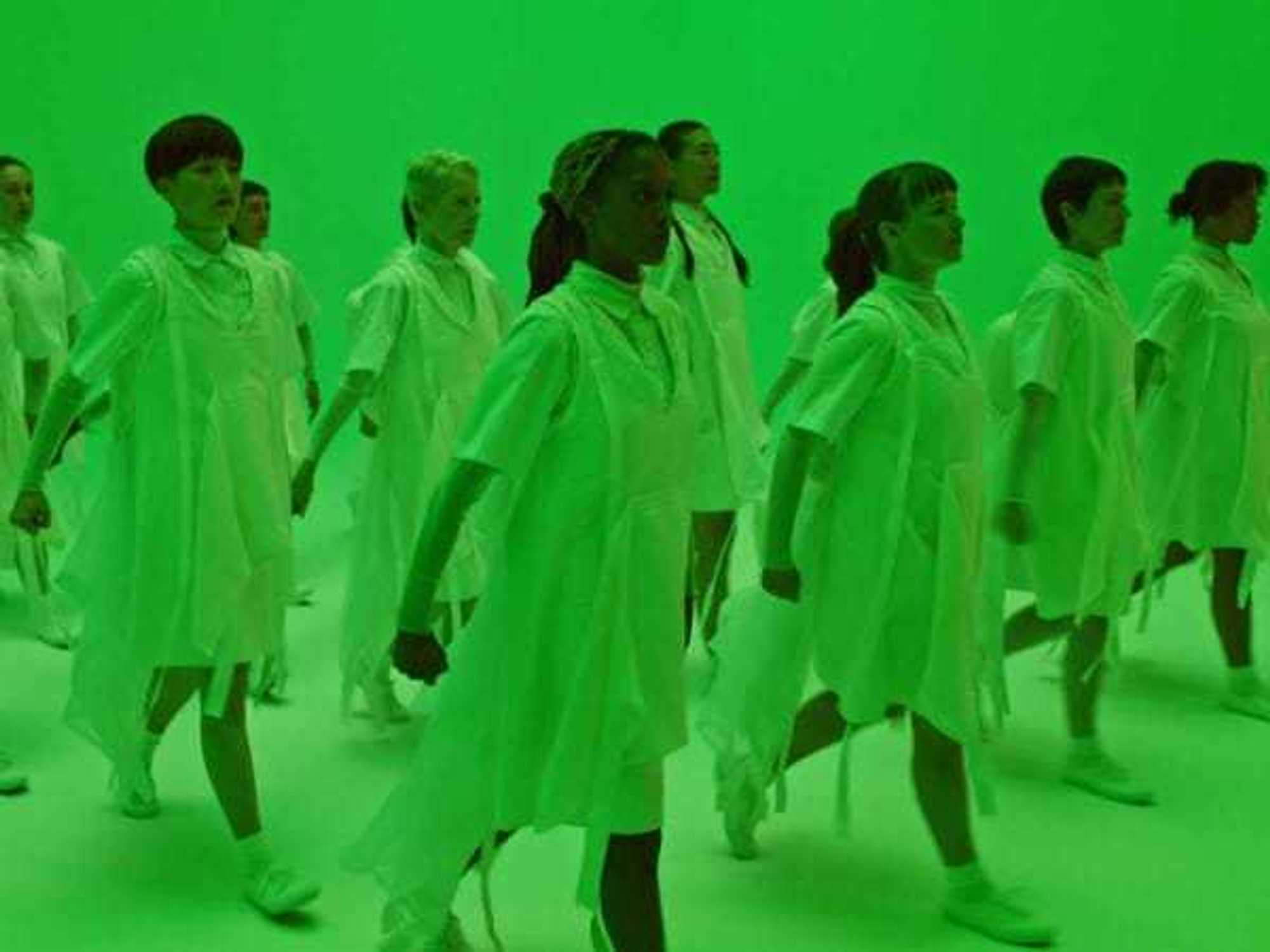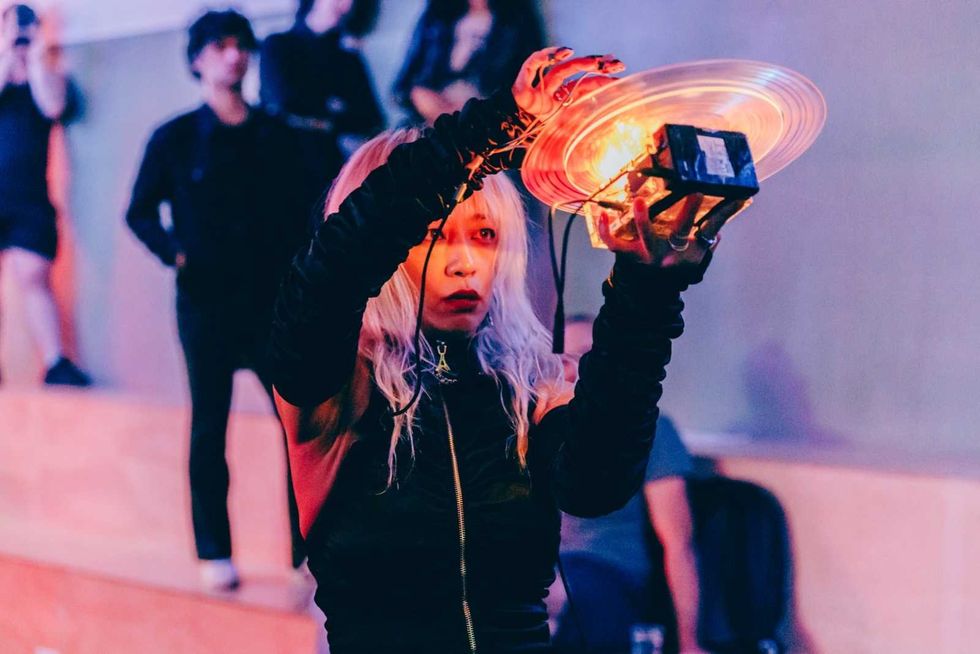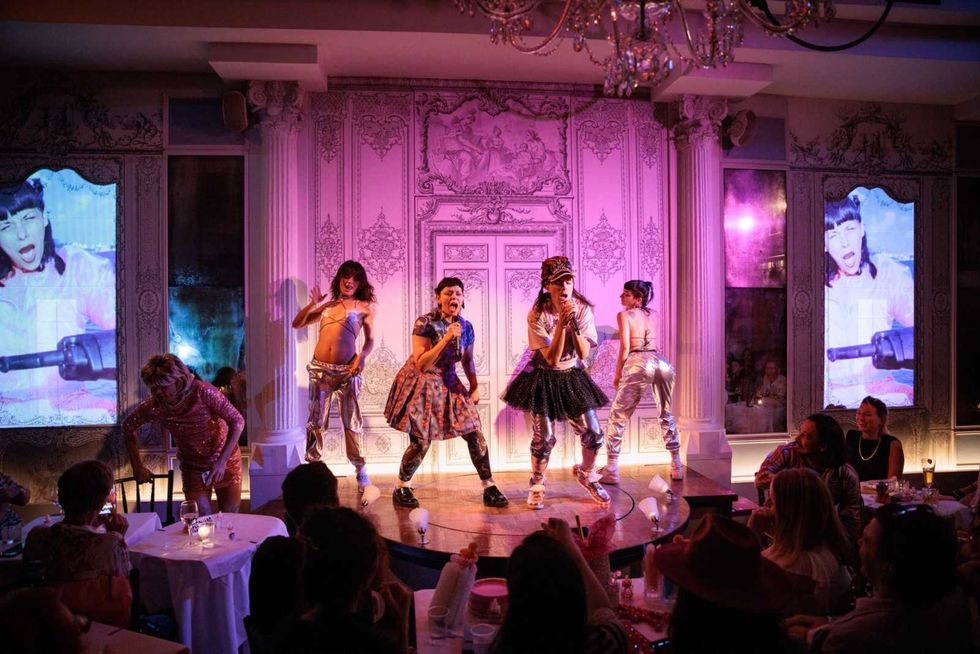Literary Heroes
Young adult fiction, please, and hold the bullshit: A conversation with LibbaBray
 Libba Bray
Libba Bray Libba Bray's newest book The Diviners
Libba Bray's newest book The Diviners
“She’s pretty unapologetic. And you know that if you ever got stuck somewhere, she would have the gin.”
That’s young adult novelist Libba Bray describing the protagonist of her new novel, The Diviners, but Bray herself gives off a similar impression. A keynote speaker at the upcoming Austin Teen Book Festival, she certainly seems as warm, funny and fearless as her flapper heroine, who goes up against dark supernatural forces in 1920s New York.
Bray has her own demons to face, many of which come from her adolescence. An outgoing Texas native who majored in drama at the University of Texas, she is not shy about difficult events of her own young adult life. Starting at age 14, she helped her family hide her father's homosexuality, for fear that he would lose his job as a Presbyterian minister.
At 18, she was in a serious car accident that left her with one glass eye and a completely reconstructed face. In the wake of her accident, amid suicidal depression and a personal crisis of faith, Bray discovered the power of writing. “It literally saved my life,” she says.
After bursting onto the YA scene in 2003 with a bestselling trilogy about teenage witches in a Victorian boarding school (she calls it “a Victorian Buffy the Vampire Slayer”), Bray surprised her readers with two very different novels: Going Bovine, an existential comedy about a teenage boy with mad cow disease, and Beauty Queens, a satire of reality TV, consumer culture and gender roles that manages to be both hilarious and heartwarming.
With six YA novels in multiple genres, not counting the three she wrote pseudonymously for a mass producer of teen book series (“McNovel! Drive through, please!”), Bray seems determined to explore her identity as a YA writer to its uttermost limits.
The one thing she won’t do, though, is mince words, as CultureMap learned in a recent interview. Her teenage fans won’t let her. “They can smell bullshit a mile away, and they will call you on it.”
CultureMap: You say that it was “love at first sight” for you with YA. What drew you to it?
Libba Bray: I just read this great quote by Junot Diaz, he was talking about true intimacy, and he was saying that it was the willingness to be vulnerable and to be found out. That’s what I felt that YA did. It wasn't pretentious, and it wasn’t hiding its heart. It wanted to be found out...
It felt like those moments when you go to a party and you're standing around for a long time, going, I don't fit in here, what am I going to talk to these people about? And everybody's getting drunk, and then you find this one person, and you end up sitting in some corner talking about all these arcane things.
And then before you know it you're having a conversation about the meaning of life and it's four o’clock in the morning. That kind of feeling, that kind of intimacy — I felt like that's what I got from YA.
CM: You’re working within YA, but you've done so much different stuff and that seems to be kind of unique. I wonder if you could talk about playing with different genres.
LB: Some days I wake up and I think, “Today I would like to wear an outfit that's very Audrey Hepburn in Roman Holiday.” Or, “Today I would like to dress like Devo.” I mean, I like so many different things that I couldn’t imagine being tied to one kind of storytelling, that's just not the way that I am.
I am an eclectic person, and so, because my interests are quite varied and my reading tastes are quite varied, I feel like it would make sense that my storytelling would also be quite varied. Or perhaps I just have a penchant for career suicide.
CM: Especially since [the Gemma Doyle books] were so successful, to go in a different direction seems very daring in a way.
LB: She eats danger for breakfast! And then she gets, like, a little repeating action. Danger repeats on her.
CM: I'm in the middle of Beauty Queens right now. I have to say, I love it. Being a Texas girl, as soon as that Miss Texas character opened her mouth, I could hear the accent. I was like, oh, I know those girls!
LB: I hail from the hometown of two Miss Americas, you know. I'm from Denton, north of Dallas. I always say it's like Tattoine with a Walmart.
"But listen man, I read Wuthering Heights. I wanted me a little Heathcliff action. I mean, why can't we indulge that fantasy and also be like, 'And now I would like the ERA passed, please. Also, this lipstick is fuckin' killer.'" - Libba Bray
CM: In Beauty Queens, the satire really comes out swinging. People have asked you about gender in your books before, and also the critique of consumerism — is that something you feel really strongly about?
LB: Here’s the story about Beauty Queens. A few years ago [YA author] David Levithan called me up and said, “I have an idea for a story, and you need to write it. Let’s go have lunch.” He said the magic word, which was lunch. So we went to have lunch, and he said, “Here’s the one sentence: Plane-load of teen beauty queens crash on an island.” I was like, Aw, dude! I want to write that book!
I thought that would be so fun, to lampoon that kind of stuff. And then when I actually got down to writing it, I thought, I don't want to lampoon these girls, because I feel for them. The truth is that so much had happened in terms of setting women back in that amount of time, and I was really troubled by that.
I thought, why is there so much misogyny? I mean, I know that misogyny is always with us, but why is there so much misogyny? And at the same time I had a lot of questions about gender. One of the things that I enjoy about writing is that it forces me to question my own status quo. It is really easy to get complacent and think, well I believe this, or I think this.
And when you start getting in there and digging around in the guts of the story, you're like, I thought I believed this, but I don't know... I think sometimes in literature we kind of police ourselves. I know a lot of people talked about Twilight, and they would say, oh, but the heroine, she lets this man make her decisions. And I thought, that may not be the particular fantasy or trope that works for me.
But listen man, I read Wuthering Heights. I wanted me a little Heathcliff action. I mean, why can't we indulge that fantasy and also be like, “And now I would like the ERA passed, please. Also, this lipstick is fuckin' killer.”
CM: Beauty Queens is full of young women who are struggling with their identities, not just as women, but as people of color, or disabled, or transgendered. The heart of the book seems to come from that struggle with identity. I wondered if there was any basis for that in your own life.
LB: Absolutely. It doesn't matter if you're 14 or 40, you’re still working on identity, you're still trying to figure out who you are. Like, alright, well who am I now? And I think that never goes away. Growing up in Texas, you’re supposed to be alluring, but also have a sort of Britney child-bride thing — kind of wholesome. You’re not supposed to take charge of your sexuality. And I just did not feel that way!
I was like, well, I feel kind of large-and-in-charge about my sexuality. I grew up in the church as well. And I thought, I feel really sexual, why is that I have to hide that? Why is the world so afraid of that? Why is it that I have to apologize for it and pretend that I don't enjoy it, that it's not like this great, juicy, awesome thing? Why is it that I have to feel shame about it? And that has bothered me my whole life.
I think it is a real push-pull for women. I think we get a lot of mixed messages, and I think we give ourselves mixed messages. And we give our daughters mixed messages, because it just perpetuates. That is part of what I wanted to get to in Beauty Queens. Just pay attention to the rhetoric. Pay attention to the messages.
Because if you can deconstruct the rhetoric, it's like The Matrix, those are the bullets that you are trying to learn how to dodge and make fall in front of you. But if you don't know how to think critically, if you can't hear a message like “Well, we really want to protect women" and understand that “protect” really means “oppress,” well... Yes, it makes you angry to hear that, but then you also have to think, where does that come from?
Unless you can trace it back, you can't really start trying to root it out at the source. But when push comes to shove about somebody trying to take your rights away — you can try to do all that, but if you're up against somebody who's irrational, you just have to fight like hell. You just have to say oh hell no, you are not taking my rights.
CM: Sing it. What's going on now is just making me feel that way every day.
LB: It’s mind-boggling, the hate that is coming out.
CM: So you're writing from a place of anger and curiosity, trying to work out those feelings. But do you also write specifically to educate? Is there a pedagogical aim behind your writing for young girls specifically?
LB: No. I think that when you get into that, it's a PSA and not a story. There always has to be a beating heart to a story. It gets back to that Junot Diaz quote, your willingness to drop all your defenses and explore yourself with a sort of brutal honesty. And if you are adopting some kind of pedagogical perch, then you're not there. You're not inside your story, you're outside of your story.
CM: Speaking of which, let's talk about The Diviners. So, you took off the corset from the Victorian era, and now you're in with the flappers.
LB: With Diviners I basically just took everything that I'm interested in and threw it into a big Cobb salad of a series. The Diviners is set in the 1920s in New York City. It combines horror and politics and, I suppose, superheroes in a way. I was writing a historical and supernatural story, but at the same time I had wanted to write something about post-9/11 America.
This is four or five years ago, and I thought, we are doing things like waterboarding, we are torturing people and calling it “enhanced interrogation techniques.” Is this really the America that I belong to? So I started reading up on the 1920s. As I looked at it I thought, well holy cow, we never learn anything, do we?
There were all these uncomfortable parallels between the two, like the anti-immigration fervor, the fears of terrorism because of anarchism and the red scare and the eugenics movement, which is scary as hell. I start reading about all of this stuff, and I thought, wow, the monsters that we think we're fighting are never as scary as the monsters that are actually happening.
So it's a story about America and politics, and the American myth — and flappers and booze and things that go bump in the night. And monsters.
---
The Austin Teen Book Festival takes place from 9:30 a.m. to 5:00 p.m. this Saturday at the Palmer Events Center. The event is free and open to the public. To read more about Libba Bray’s religious upbringing, her life-changing car accident and how writing literally saved her life, see the full interview on Amy Gentry’s blog, The Oeditrix.

 Austin artists Mark Flood and Evcksun will bring their interdisciplinary collaboration to the Fusebox Festival in April. Photo courtesy Fusebox Festival
Austin artists Mark Flood and Evcksun will bring their interdisciplinary collaboration to the Fusebox Festival in April. Photo courtesy Fusebox Festival Novelitas de Ninas are a feminist musical soap opera performance appearing at the Fusebox Festival.Photo by Walter Wlodarczyk
Novelitas de Ninas are a feminist musical soap opera performance appearing at the Fusebox Festival.Photo by Walter Wlodarczyk